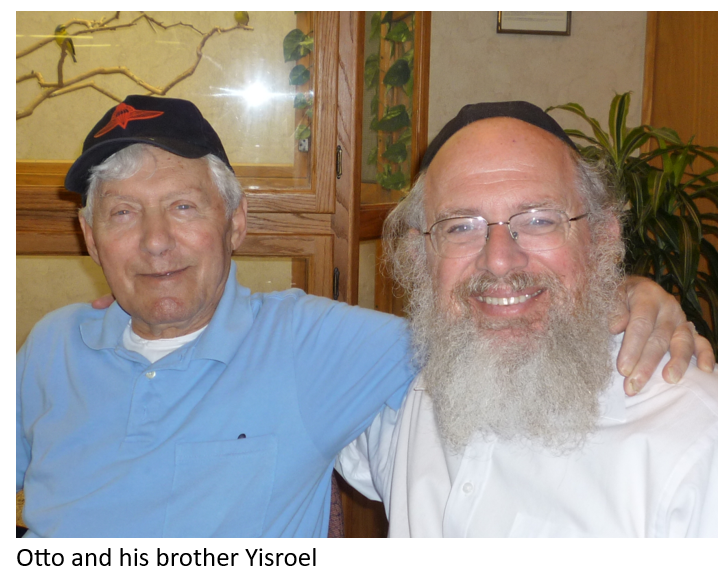Otto Herczeg
"Learn how to protect yourself. Learn how to use weapons to defend yourself. Always stand up to defend your beliefs and your religion. Fight anti-Semitism. Don’t follow false hopes. We don’t know what’s on the other side, maybe it’s better. "
Date of birth
01/10/1931
Where were you born?
Where did you grow up?
Miskolc, Hungary
Name of father, occupation
David,
Estate manager for Hungarian nobleman
Maiden name of mother, occupation
Eleanor Lax,
Homemaker
Immediate family (names, birth order)
Parents, me and my younger sister, Valika
How many in entire extended family?
50
Who survived the Holocaust?
My father, six cousins and me
We had a nice Jewish life in Hungary before the war. In 1943, the Hungarian government became fascist and made life miserable for the Jewish population even before the Germans came in. In 1944, when the Germans came in, my Jewish school was closed. As I returned to Miskolc, the train I was on crossed a large river. German authorities boarded the train asking for identification. I was lucky that I had a photo identification of myself that did not state that I was Jewish. I remember two observant Jewish with Payos (religious sidelocks), being removed from the train. I never found out what happened to them. One week later, Jews had to wear a yellow Jewish star on their clothing to be identified as Jews.
My family was taken to the ghetto in Miskolc. My father and I were taken out of the ghetto to working to crush rocks for road repair. My father was later taken to work on the Russian front digging trenches for the Hungarian army. Later, my mother, sister, and I along with thousands of other Jews were taken to a large brick factory. From there, we were transported to Auschwitz-Birkenau. The cattle car was the worst part of my experience in the Holocaust. People were packed in so tightly, one on top of another, which included my mother, sister, and I; about 60-70 people. There was no bathroom, no food, there were old people, sick people yelling and screaming, babies crying
I was taken to Auschwitz-Birkenau and then later to Buchenwald, where I was for one year. At Birkenau, there was Mengele who decided who would live and who would die. He would point who would go to this side and who to that side. After the selection, they put me in barracks. Those on the other side went straight to the crematorium. The same day I smelled burnt flesh.
I was in a temporary camp run by I.G. Farben, putting coal dust into ten pound bags. It gave off smoke to camouflage the factory.
I always believed I would be freed but I didn’t know how, I had to have that belief in order to survive. Those who gave up, died. In Zeitz, near Buchenwald, the Germans asked who wants to go to a sanitarium to get rest. I volunteered. I didn’t know they were liars. Forty of us were in that group. A Czech doctor and an SS were there. I was first in line and while the SS wasn’t looking, the doctor told me to get out of that line. Of the forty of us, only eight of us survived, the rest were taken to the crematorium. I was blessed.
I was liberated by American soldiers on April 11, 1945. The French government arranged to take 400 of us who were under 18 to France. I learned that my father was alive in Hungary, and went back to meet him there. We came to New York in 1948 and eventually bought a dairy farm in upstate New York, but couldn’t make a living. Later we came to Detroit where I had a cousin
My father later remarried and had a son who is now a rabbi in Jerusalem, Rabbi Yisroel Herczeg (see photograph).
Name of Ghetto(s)
Name of Concentration / Labor Camp(s)
When did you come to the United States?
1948
Where did you settle?
Upstate New York
How is it that you came to Michigan?
I had a cousin living here in Detroit
Occupation after the war
Assembly line driver, meat business
When and where were you married?
1958
Spouse
Erika,
PhD, political science
Children
Charles, Insurance salesman
Grandchildren
Twins, a boy and a girl – Sophie and Max
What do you think helped you to survive?
G-d and pure luck. I could have been killed every minute.
What message would you like to leave for future generations?
Learn how to protect yourself. Learn how to use weapons to defend yourself. Always stand up to defend your beliefs and your religion. Fight anti-Semitism. Don’t follow false hopes. We don’t know what’s on the other side, maybe it’s better.
Interviewer:
Charles Silow
Interview date:
07/29/2011
Experiences
Survivor's map

